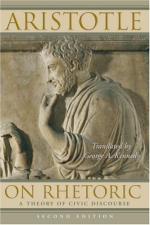
|
Book I, Chapters 1-3
• Aristotle defined rhetoric as neither an art nor a science because it was a form of persuasion.
• By examining both sides of a question, the truth can be located, and positions defended with accuracy.
• As one of the three modes of persuasion, the ethical appeal attempted to validate the speaker's credibility.
• The second mode of persuasion, emotional appeal, utilizes feelings rather than reason, while the third mode of persuasion, the logical appeal, is based on sound argumentation.
• Aristotle ended the section with a discussion of the three main areas of rhetoric: political, legal, and epideictic.
Book I, Chapters 4-9
• The five subjects of political oratory were outlined in Book I, Chapter 4, including resources, national defense, and legislation.
• A political rhetorician's plan should be in line with the happiness or prosperity of the state or country.
• Aristotle described the good as being comprised of happiness...
|
This section contains 1,151 words (approx. 4 pages at 300 words per page) |

|




